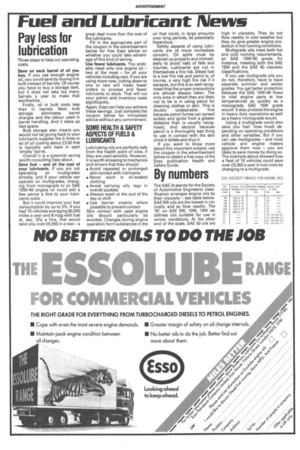SOME HEALTH & SAFETY ASPECTS OF FUELS & LUBRICANTS
Page 43

If you've noticed an error in this article please click here to report it so we can fix it.
Lubricating oils are perfectly safe from the health point of view, if they are used sensibly. However, it is worth stressing to mechanics and drivers that they should: • Avoid repeated or prolonged skin contact with lubricants • Never work in oil-soaked clothing • Avoid carrying oily rags in overall pockets • Always wash at the end of the day or shift • Use barrier creams where possible to prevent contact Skin contact with used engine oils should particularly be avoided. Changes during engine operation form substances in the oil that could, in large amounts over long periods, be potentially hazardous.
Safety aspects of using lubricants are of more immediate concern. Oil spills must be oleaned up properly and immediately to avoid risks of falls and injuries. Lubricants are not in themselves a fire risk. Diesel fuel is a low fire risk and petrol is, of course, a very high fire risk if it escapes, but this is so well recognised thatthe proper precautions are almost always taken. The only area in which they are likely not to be is in using petrol for cleaning clothes or skin. This is doubly undesirable: -first because petrol fumes can spread widely and ignite from a greater distance than is usually recognised; and second because petrol is a thoroughly bad thing to use in contact with the skin since it defats and drys it.
If you want to know more about this important subject, use the coupon in the advertisement below to obtain a free copy of the Esso publication Health and Safety Guide.




























































































